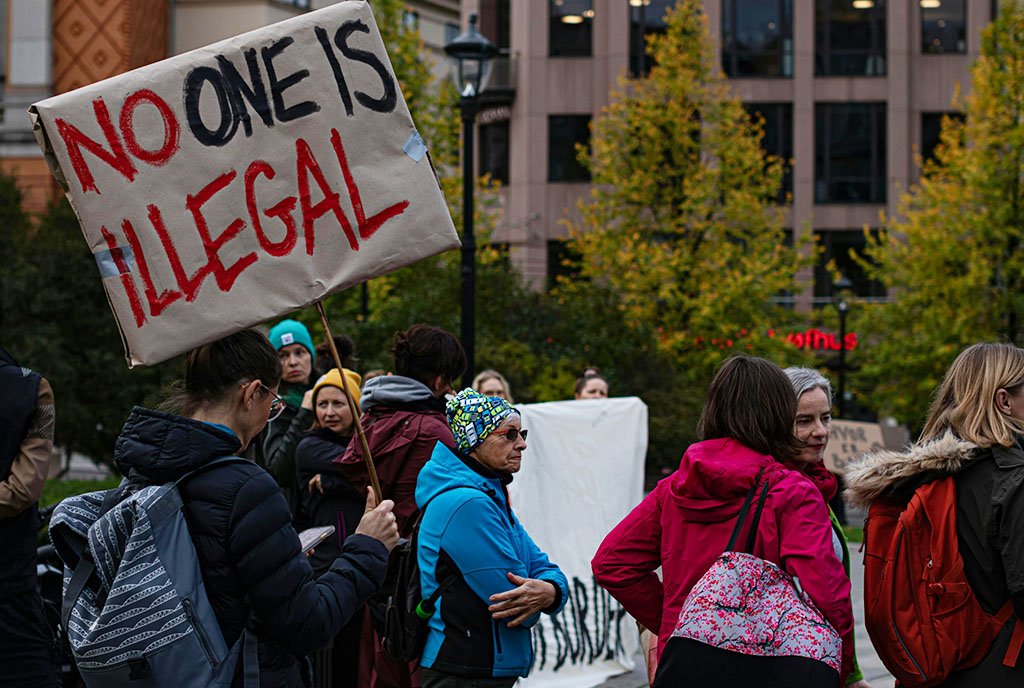
October 18, 2018; New York Times
“We’re traveling to find a better future for my daughters,” explains Fanny Rodríguez, who is one of as many as 4,000 Hondurans making their way in a caravan toward the US border. “We’re not going because we want fancy things.”
That’s what is not understood by President Trump and other US officials threatening to use more border guards, walls, family separations, and even a trade war to halt the caravan from getting close to the American border. The forces that drive these individuals and families to attempt the trip are far stronger than any threat they—or others in decades past—could dream up. Some are fleeing gangs that terrorize their neighborhoods; others are seeking to escape domestic violence in their own homes. Still others, like Rodríguez, are desperate for jobs that can pay for school and other living expenses.
The caravan—the second this year—comes less than three weeks before the November 6th midterm elections, causing the usually overheated immigration-related rhetoric to boil over.
….In addition to stopping all payments to these countries, which seem to have almost no control over their population, I must, in the strongest of terms, ask Mexico to stop this onslaught – and if unable to do so I will call up the U.S. Military and CLOSE OUR SOUTHERN BORDER!..
— Donald J. Trump (@realDonaldTrump) October 18, 2018
Earlier this year, the Trump administration announced its “zero tolerance” policy, leading to the separation of families at the border. More than 200 children remain in federal custody after over 2,500 children were separated from their parents from April to June, when Trump finally caved to pressure and halted the program (although he has not ruled out resuming the practice).
Trump himself made the case for deterrence in a 60 Minutes interview: “When you don’t do separation, when you allow the parents [and children] to stay together, okay, when you allow that, then what happens is people are gonna pour into our country,” he said.
Trump is not the only US president who believed a sanctions approach to immigration works. Former President Barack Obama’s administration tried to prevent people from crossing the border through a number of tactics, including family detention (albeit without separating them from each other) and running ads in Central America to discourage people from making the journey.
Sign up for our free newsletters
Subscribe to NPQ's newsletters to have our top stories delivered directly to your inbox.
By signing up, you agree to our privacy policy and terms of use, and to receive messages from NPQ and our partners.
But evidence shows these practices largely don’t succeed. The think tank Center for American Progress evaluated changes over time—from October 2011 to June 2018—in the monthly number of US Border Patrol apprehensions of families at the southwest border. It found there was no statistically significant decrease in apprehensions of families at the border after the widespread expansion of family detention in July 2014. This was found to be true even after taking seasonal trends into account.
US-bound migrant caravans have been attempted for years. Traveling in numbers is perceived as offering protection from assaults, robberies, and shakedowns by police. They’re also a cheaper and presumably safer alternative to the $7,000 to $10,000 that smugglers charge for passage to the border, notes Stephanie Leutert, director of the Mexico Security Initiative at the University of Texas at Austin. Still, it wasn’t until this year that the caravans received widespread attention—mainly due to Trump’s predilection for tweeting his ire.
Commenting on April’s earlier caravan and its aftereffects, and foreshadowing what was to come, Amnesty International had this to say in a report this year:
Those mass pushbacks of asylum-seekers by CBP [Customs and Border Patrol] are plainly unlawful, and violate one of the most fundamental principles of international refugee law: the prohibition on refoulement (forcing people to a place where they might be at risk of serious human rights violations). This principle is incorporated into US law, which requires border and immigration authorities to receive and refer asylum-seekers for an interview with an asylum officer, in order to conduct individual assessments of any risks of persecution or torture that they may face upon return.
Current Mexican officials are responding reflexively to the pressure from the United States. When some people in the caravan broke through a border crossing with Guatemala Friday, they were met with a wall of Mexican and Guatemalan law enforcement officers who unleashed pepper spray, forcing the migrants to retreat onto a bridge. Apparently pleased, Trump tweeted, “Thank you Mexico, we look forward to working with you!”
However, the incoming administration of President-elect Andrés Manuel López Obrador, who will take office December 1st, is refusing to respond quite as emotionally or vindictively. Marcelo Ebrard, who will become foreign relations secretary, dismissed Trump’s tweets as a “political calculation” ahead of the US elections. Meanwhile, López Obrador is looking for ways to avoid repression against migrants—like getting at the root cause of migration by creating jobs for Central Americans. “Anyone who wants to work in our country…will have a work visa,” he said. What a contrast to the United States!
However, the US government isn’t making it easy for Lopez Obrador to do the right thing. “Ironically, the way President Trump responds to these caravans makes it harder for the Mexican government to cooperate with the US on immigration enforcement,” says Andrew Selee, president of the Migration Policy Institute. “There is a lot of disposition in both the current and the incoming Mexican government to cooperate with the US on some aspects of immigration control. But it becomes much harder when President Trump makes this a political issue in which he bashes Mexico.”
Fortress doors and battering rams, however, seem to be the US responses of choice these days.—Pam Bailey












